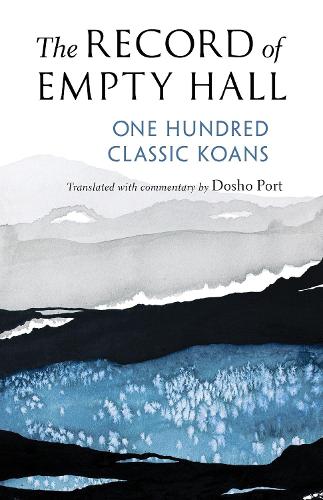
The Record of Empty Hall: One Hundred Classic Koans
(Paperback)
Publishing Details
The Record of Empty Hall: One Hundred Classic Koans
By (Author) Dosho Port
Shambhala Publications Inc
Shambhala Publications Inc
19th April 2021
27th January 2021
United States
Classifications
General
Non Fiction
294.3927
Physical Properties
Paperback
304
Width 140mm, Height 216mm
Description
A fresh translation and commentary on a classic collection of 100 koans from thirteenth-century China. A fresh translation and commentary on a classic collection of 100 koans from thirteenth-century China. The Record of Empty Hall was written by Xutang Zhiyu (1185-1269), an important figure in Chinese Linji Chan (Japanese Rinzai Zen) Buddhism and in its transmission to Japan. Although previously little-known in the West, Xutang's work is on par with the other great koan collections of the era, such as The Blue Cliff Record and Book of Serenity. Translated by Zen teacher Dosho Port from the original Chinese, The Record of Empty Hall opens new paths into the earthiness, humor, mystery, and multiplicity of meaning that are at the heart of koan inquiry. Inspired by the pithy, frank tone of Xutang's originals, Port also offers his own commentaries on the koans, helping readers to see the modern and relatable applications of these thirteenth-century encounter stories. Readers familiar with koans will recognize key figures, such as Bodhidharma, Nanquan, and Zhaozhou and will also be introduced to teaching icons not found in other koan collections. Through his commentaries, as well as a glossary of major figures and an appendix detailing the cases, Port not only opens up these remarkable koans but also illuminates their place in ancient Chinese, Japanese, and contemporary Zen practice.
Reviews
All those interested in the study and practice of Zen koans will be grateful for this new translation, with commentary by Dosho Port, of The Record of Empty Hall. This koan collection was compiled by Xutang Zhiyu, a prominent thirteenth-century Chinese Zen master who taught several important Japanese disciples. Port skillfully highlights Xutangs creative use of terse substitute or alternate phrases in order to bring new light to one hundred fascinating koan cases culled from all the main Zen schools. This collection beautifully complements other important koan commentaries, such as the Blue Cliff Record and the Gateless Gate.Steven Heine, author of Chan Rhetoric of Uncertainty in the Blue Cliff Record
Quietly in Nebraska, for our sake, like an old Chinese sage, Dosho Port has been immersing himself in The Record of Empty Hall, one of the last great koan collections in China. Many delightful koans are to be found here and nowhere else, and Dosho shows how they can open your life. His translation is a work of love and a gift to all of us who walk the ancient path of awakening.John Tarrant, author of Bring Me the Rhinoceros and The Light Inside the Dark
Xutang Zhiyu (Jpn.: Kido Chigu)a lineage ancestor of all Rinzai Zen teachers in the present dayfamously predicted that his teachings would flourish in Japan, but perhaps little knew that his brilliant, pithy dharma words might one day nourish Zen practitioners throughout the world. Dosho Ports The Record of Empty Hall causes this brilliance to shine widely, skillfully capturing as it does something of Xutangs mastery of the samadhi of words within an eminently readable translation. I am tremendously grateful for it.Meido Moore, author of The Rinzai Zen Way and Hidden Zen
Like some galaxy far, far away, this collection of koans has been out there all along but inaccessible to us until now. Dosho Roshi, employing vision magnified through decades of Zen experience, has brought these twinkling stars, illumined by his commentaries, right to us, for us to gaze at in delight and wonder.Bodhin Kjolhede, Abbot, Rochester Zen Center
This remarkable volume is further proof that the great treasury of Zen texts as yet unknown in English, if put in the hands of a deft and lively translator like Dosho Port Roshi, who happens also to be a deep, committed practitioner, can be brought to scintillating new life in English. Ports idiom is alive to contemporary life, and renders this centuries-old text urgently relevant to these challenging times. A shining new treasure for us all.Henry Shukman, author of One Blade of Grass: Finding the Old Road of the Heart
Theres a lot of Zen scholarship that seems designed only for insiders. This is not that kind of book. . . . Youll want to sit with the koans, rereading them or not thinking about them, just taking a walk in their shadow. Then youll enjoy Dosho Ports lively commentaries. Remember that a koan is not for your mind alone, but for your heart-mind.Spirituality & Practice
Port does an excellent job of shining a much-needed light on Xutangs work and, in his playful way, making it more relatable to the contemporary reader. . . . At times I felt as though I was right there with Port, practicing in his living room, surrounded by the same sights, sounds, and smells.Buddhistdoor Global
An invaluable resource. Doshos translations are clear and his commentary deceptively straightforward.Tricycle
Author Bio
DOSHO PORT teaches at the Nebraska Zen Center in Omaha, and with the Vine of Obstacles- Online Support for Zen Training. He has been practicing Zen since 1977, received dharma transmission in Soto Zen from Dainin Katagiri Roshi in 1989, and in 2015 received inka shomei (literally, document of succession) from James Myoun Ford Roshi in the Aitken-Tarrant line of the Harada-Yasutani-Yamada lineage. Port is the author of Keep Me in Your Heart a While- The Haunting Zen of Dainin Katagiri, and he has translated three foundational koan texts from traditional Chinese for use with students- No Gate Barrier, Blue Cliff Record, and Record of Going Easy.
